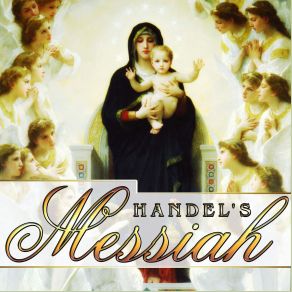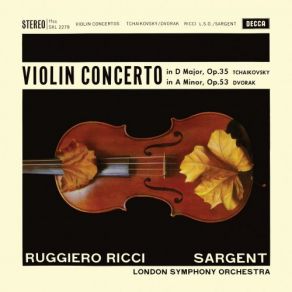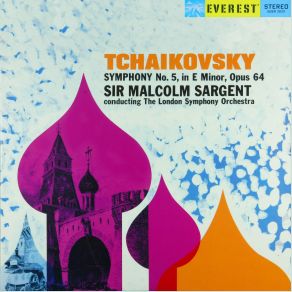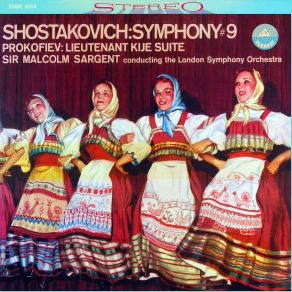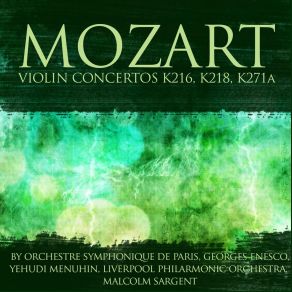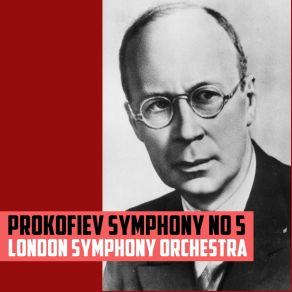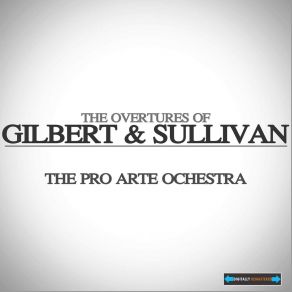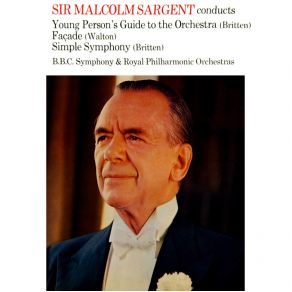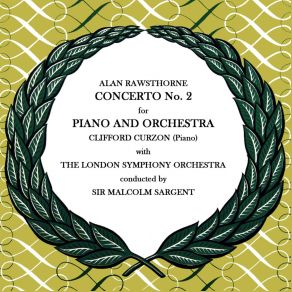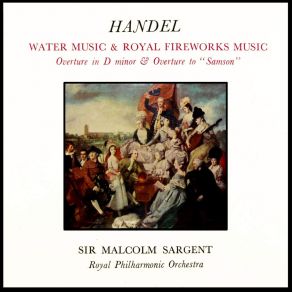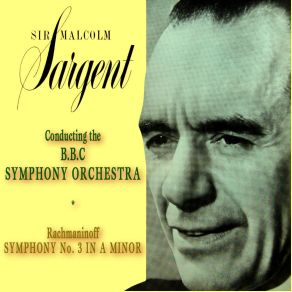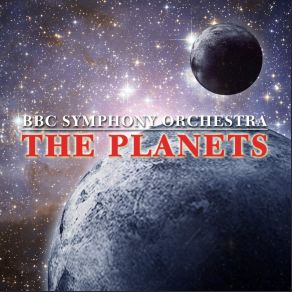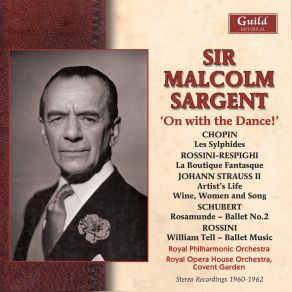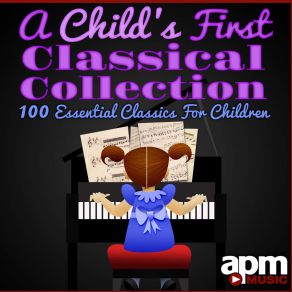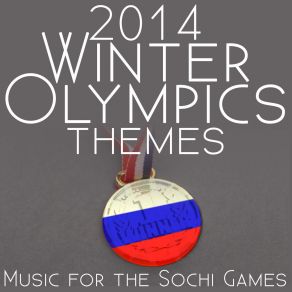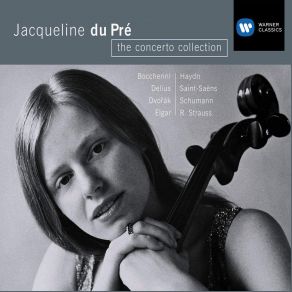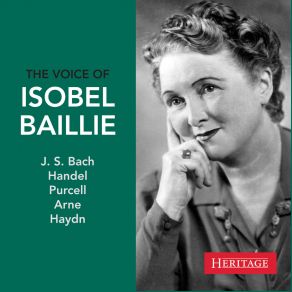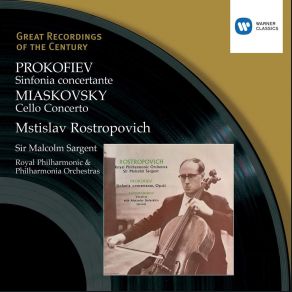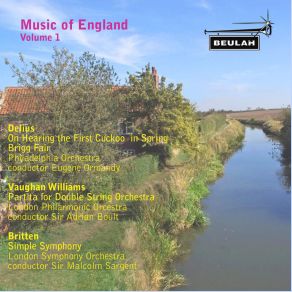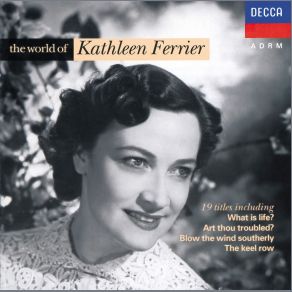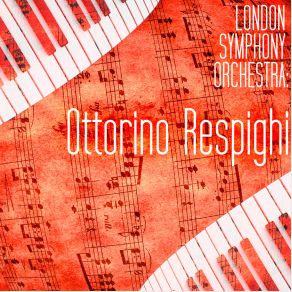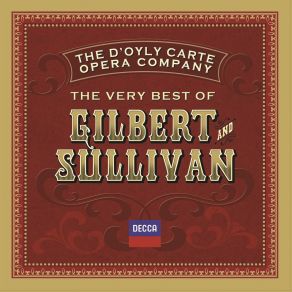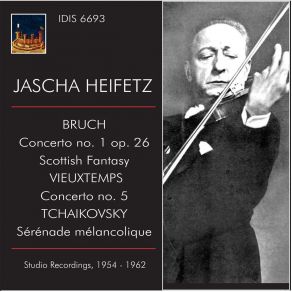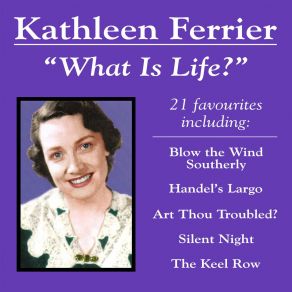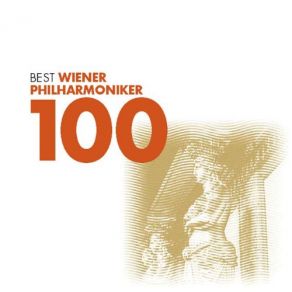Sir Malcolm Sargent
Wikimp3 information about the music of Sir Malcolm Sargent. On our website we have 70 albums and 70 collections of artist Sir Malcolm Sargent. You can find useful information and download songs of this artist.
Biography
[Edit]English conductor Malcolm Sargent was perhaps the best musical ambassador the British Isles could have hoped for in the 20th century. Equally at home with both orchestra and choir, Sargent's musical energy and unbridled enthusiasm for conveying the wonders of music took him around the globe many times over, and made him a legend in his own time.
Sargent was born into a family which had dwelled in the town of Stamford in South Lincolnshire for over five centuries. Though a coal merchant by profession, his father also served as church organist and choirmaster. It was decided at an early age that young Malcolm, too, would pursue a career in church music, and he began seriously studying music while a young student at Stamford School. In 1909, the 14-year-old boy was unexpectedly asked to fill in for an absent conductor at a local rehearsal of Gilbert & Sullivan's The Gondoliers. Despite a lack of formal training, Sargent's skillful handling of the players made quite a splash in the small town, and later that year he was invited to conduct a musical pageant depicting a royal visit to Stamford.
At 16 Sargent took the Associateship diploma of the Royal College of Organists, and was sent as an apprentice to the organist of Peterborough Cathedral. In 1914 he received his Bachelor of Music degree from Durham and became parish organist of Melton Mowbray, where Sargent quickly began to set up community musical activities (his interest in the musical life of the "common folk" would remain a driving force throughout Sargent's life). Sargent served in the 27th Durham Light Infantry during the First World War, and upon discharge took his doctorate of music (Durham again) — the youngest man in England up to that time to hold the degree — and became a pupil of Russian-born British pianist Benno Moiseiwitsch.
Uncertainty about his future musical course was eliminated in 1921 when Sir Henry Wood invited Sargent to conduct his own Impression on a Windy Day (Sargent's first and only real venture into the realm of composition) at a Promenade Concert in London. By 1923, greatly helped by Wood's fatherly encouragement, Sargent had joined the teaching staff of the Royal College of Music, and his career as a conductor seemed well on its way.
In 1924 he served as chief conductor of the Robert Mayer children's concerts, and for two seasons beginning in 1926 led the D'Oyly Carte Opera Company in London. It was during this same period that he began his prolific recording career with a collection of highlights and excepts from the Ralph Vaughan Williams opera Hugh the Drover in 1924. The advent of electrical recording the following year, with its attendant improved fidelity for orchestral performances, led to his first set of recordings of the Gilbert & Sullivan operettas during the late '20s, which were sufficiently popular and important to remain in print on LP in the 1970s and on CD in the decades after.
He served as assistant conductor for the Ballet Russe's London seasons in 1927 and 1928. Never forgetting his foundation in choral music, Sargent accepted leadership of the Royal Choral Society in 1929 (a post he held for the next 20 years), and the Huddersfield Choral Society in 1932. In that same year he helped Sir Thomas Beecham found the London Philharmonic Orchestra, with which he would be closely associated from then on. From 1939 to 1942 he was chief conductor of the Hallé Orchestra, and from 1943 to 1949 led the Liverpool Philharmonic. In 1950 Sargent replaced Adrian Boult as head of the BBC Symphony Orchestra (Sargent in turn handed over the reins to Rudolf Schwarz in 1957). From 1948 until the year before he died Sargent organized and conducted the Promenade Concerts in London.
Although less important to him than his work with choirs and orchestras, Sargent found time to conduct several operas throughout the years. He gave the premieres of three Vaughn Williams operas (Hugh the Drover, 1924; Sir John in Love, 1929; Riders to the Sea, 1937), as well as Gustav Holst's At the Boar's Head in 1925 (with the recently founded British National Opera Company). Sargent introduced Sir William Walton's Troilus and Cressida at Covent Garden in 1954.
Frequent touring introduced Sargent's uniquely energetic brand of music-making to a wide audience around the world (including the U.S.S.R., South Africa, and the Far East). In 1947 he was knighted for his conspicuous service to British music. He was passionately devoted to the music of his countrymen, and firmly believed that the great works of Elgar, Walton, Vaughan Williams, and Delius would eventually take their place alongside the great classics of Western art music. Invited by Toscanini to conduct several performances of the NBC Symphony, Sargent used the venue as an opportunity to expose American audiences to a wide range of British composers.
Ironically, as he was — with his friend and onetime mentor Beecham — the quintessential English conductor to many people abroad, at home he was a somewhat more controversial figure, in part because of his sheer ubiquitousness. With his impeccable grooming and elegant figure — always with a red carnation in his lapel — he seemed all the more visible. Sargent conducted more performances than virtually any musician of his era, too many in some ways to ever achieve greatness at much, in the estimation of some critics. To many British concertgoers, he was dismissed as "Flash Harry" — a nickname that was critical as well as affectionate — for his seeming superficiality, and he was regarded somewhat unfairly as a musical jack of all trades and a master of none. It was true that his efforts at such Germanic and European repertory staples as the Beethoven or Brahms symphonies, or pieces such Smetana's Ma Vlast — which was in print for many years in America as a budget double LP from Angel Records — were easily dismissed in favor of renditions by more inspired hands; and his version of even some English-spawned staples as Holst's The Planets were eclipsed by those of his colleague and rival Sir Adrian Boult (who, in fairness, had conducted the premiere of the piece and did at least three notable recordings of it across 40 years). On the other hand, he was among the very finest choral conductors in England — and not just of his own time — and on works in that idiom from Baroque to post-Romantic was fully the measure of a Beecham or a Boult. Among his many credits are a 1945 recording of Elgar's The Dream of Gerontius — the first full-length recording of a 20th century oratorio — that remains ranked right alongside more recent stereo and digital documents of the work well into the 21st century. And he was a superb accompanist on several notable recordings, with Schnabel on the Beethoven piano concertos, Paul Tortilier's legendary (some would say never equalled, not even by Tortilier in his two subsequent attempts) 1954 recording of the Elgar Cello Concerto, and Jacqueline DuPre's dazzling recording of the Delius Cello Concerto, from the start of her recording career.
He maintained a hectic schedule which would have broken many conductors of less will (or sheer energy), and yet somehow found time to maintain a wide range of extra-musical interests — the breadth and depth of his knowledge was revealed when he became a member of the BBC Brains Trust during the war. Despite his extraordinary professional success, Sargent never lost touch with his rural roots (he in fact founded a symphony orchestra in Leicester), and his down-to-earth attitudes to music came as a breath of fresh air to many listeners tired of the weary, pedantic approach of many serious musicians. A firm believer in fundamental musical intent as opposed to superficial accuracy, Sargent was not loathe to alter a musical score in instances when he felt an advancement in instrument technology made a better realization of the composer's intent possible, though he never recommended this course of action to those without the knowledge and intuition to make such changes effectively. All of this knowledge and the sensibilities behind them were couched in a quick-witted persona that, when turned loose, could be among the most eloquent and cuttingly funny personalities in music.
Between the 1920s and the 1960s, he recorded for all of the major labels in England, most notably for EMI, and left behind a string of musical documents across five decades that spread his name and reputation at the time and have comprised his legacy since. Although most of his recordings were done in the 78 rpm era, Sargent got in a significant amount of work in the studio across the last 15 years of his career on LP, in mono or stereo. As with his performances, many of these documents are very good — his account of Vaughan Williams' Fantasia on a Theme of Thomas Tallis or Serenade to Music — without being great; and many, even of the British works, have fallen aside in the face of true greatness, by the likes of Boult, Beecham, Sir John Barbirolli, et al., for the same label. But a few have stood out — his EMI rendition of The Planets was available on Capitol Records in America for many years, and was paired with the composer's own electrical recording in a double-LP set devised by Rod McKuen's Stanyan Records label in the early '70s, and thus became the one first heard by many Americans in the "post-psychedelic" era; similarly, in the late '50s, with the lapsing of the last of the copyrights involved, EMI allowed Sargent to return to his beloved Gilbert & Sullivan operettas and do new stereo versions with some of the best singers ever to grace that repertory — although he was criticized by some for his slow, deliberate tempos, the quality of the musicianship and the singing is beyond reproach. Those recordings have remained in print for decades and are still considered effective rivals to the concurrent body of complete G&S works done by the D'Oyly Carte company for Decca Records. And he left behind two versions of Handel's Messiah that were notable in the stereo era (in addition to a mono rendition from 1954 that, so accounts say, could knock one's socks off) — his 1959 EMI recording, with the Royal Liverpool Philharmonic and Huddersfield Choral Society, was justifiably a best-seller for decades, big-band Handel that was among the first stereo releases of the piece, fully exploiting the sound separation and enhanced by a big, lusty, vigorous approach, even if its tempos seem too stately by modern standards; and his 1965 version for Reader's Digest, available from Chesky Records on CD, with a Royal Philharmonic Orchestra version, with the Royal Choral Society, with tempos that are a bit slower but playing and singing that are so exquisite that one hardly minds the extended immersion, especially because it was recorded to what amounts to an audiophile standard.
By the mid-'60s, Sargent's activity had slowed in the face of declining health and also the arrival of a new generation of conductors, including Sir Charles Mackerras, Sir Colin Davis, Sir David Willcocks, and Sir Charles Groves, and the continued robust careers of Boult and Barbirolli. Sir Malcolm Sargent died from cancer in 1967 at the age of 72. He left behind provision for a charity, The Malcolm Cancer Fund, organized to support the care of children suffering from leukemia and research toward a cure for leukemia and other forms of cancer. ~ Blair Johnston & Bruce Eder, Rovi
Title: Handel: Messiah, HWV 56
Artist: Royal Liverpool Philharmonic Orchestra, Sir Malcolm Sargent
Genre:
Title: The Piano Library: Mark Hambourg, Recordings from 1927 to 1933
Artist: Mark Hambourg, Sir Malcolm Sargent
Genre:
Title: Gilbert & Sullivan: Favorite Overtures
Artist: Sir Malcolm Sargent, Pro Arte Orchestra
Genre:
Title: Sargent’s Overtures / Sargent's Overtures
Artist: Sir Malcolm Sargent, Pro Arte Orchestra
Genre:
Title: Respighi: The Fountains of Rome & The Pines of Rome
Artist: Sir Malcolm Sargent, London Symphony Orchestra
Genre: Classical
Artist: London Symphony Orchestra And Chorus, Sir Malcolm Sargent
Genre:
Title: Conducts Vaughan Williams
Artist: London Symphony Orchestra And Chorus, Sir Malcolm Sargent
Genre:
Title: Tchaikovsky: Symphony No. 5 In e Minor, Op. 64
Artist: BBC Symphony Orchestra, Sir Malcolm Sargent
Genre:
Title: Prokofiev: Symphony No. 5
Artist: London Symphony Orchestra And Chorus, Sir Malcolm Sargent
Genre:
Title: Jascha Heifetz - Original Jacket Collection
Artist: John Newton, Chicago Symphony Orchestra, RCA Victor Symphony Orchestra, Boston Symphony Orchestra, Jascha Heifetz, Dallas Symphony Orchestra, Osian Ellis, Brooks Smith, William Primrose, Gregor Piatigorsky, Erick Friedman, Los Angeles Philharmonic, New Symphony Orchestra Of London, Fritz Reiner, Charles Munch, Chamber Orchestra, Sir Malcolm Sargent, Alfred Wallenstein, Daniel Guss, Thornton Lofthouse, Izler Solomon, Walter Hendl, Donald Voorhees
Genre: Classical
Title: The Overtures of Gilbert and Sullivan (Remastered)
Artist: Sir Malcolm Sargent, Pro Arte Orchestra
Genre:
Title: The Piano Library: Artur Schnabel
Artist: Artur Schnabel, London Symphony Orchestra And Chorus, Sir Malcolm Sargent
Genre:
Title: Sargent's Enigma
Artist: London Symphony Orchestra And Chorus, Symphony Orchestra, Sir Malcolm Sargent
Genre:
Title: Rawsthorne: Concerto No. 2
Artist: Clifford Curzon, London Symphony Orchestra And Chorus, Sir Malcolm Sargent
Genre:
Title: Gilbert & Sullivan: H.M.S. Pinafore
Artist: Glyndebourne Festival Chorus, Sir Malcolm Sargent, Pro Arte Orchestra
Genre: Classical
Title: Last Night of the Proms (1957)
Artist: BBC Symphony Orchestra, Sir Malcolm Sargent
Genre: Orchestral, Orchestral
Title: Live In London 1958 and 1959
Artist: Maria Callas, The Royal Philharmonic Orchestra, Sir Malcolm Sargent
Genre: Opera
Title: Sargent Conducts British Music
Artist: The Royal Choral Society, Symphony Orchestra, Sir Malcolm Sargent
Genre:
Title: Famous Popular Overtures
Artist: The Royal Philharmonic Orchestra, Sir Malcolm Sargent
Genre:
Title: Handel: Water Music & Royal Fireworks Music
Artist: The Royal Philharmonic Orchestra, Sir Malcolm Sargent
Genre:
Title: Schubert: Unfinished Symphony
Artist: The Royal Philharmonic Orchestra, Sir Malcolm Sargent
Genre:
Title: Variations And Fugue On A Theme Of Purcell
Artist: BBC Symphony Orchestra, Sir Malcolm Sargent
Genre:
Title: Viola Concerto
Artist: John Pritchard, William Primrose, Chamber Orchestra, The Royal Philharmonic Orchestra, Sir Malcolm Sargent
Genre:
Title: Delius: Cello Concerto & Song of Farewell
Artist: Jacqueline Du Pré / Jacqueline Du Pre, Sir Malcolm Sargent
Genre:
Title: Elijah
Artist: Royal Liverpool Philharmonic Orchestra, The Huddersfield Choral Society, Sir Malcolm Sargent
Genre:
Title: Rachmaninov: Piano Concerto No. 2
Artist: Moura Lympany, The Royal Philharmonic Orchestra, Sir Malcolm Sargent
Genre:
Collections
Title: Coming Soon - Classical Music from Movie Trailers
Genre:
Title: 66 20th Century Masterpieces
Genre: Classical
Title: British Composers - Britten, Berkeley & Rubbra
Genre:
Title: 111 Classical Masterpieces, Vol. 3
Genre: Classical
Title: Halloween - 50 Classical Music Essentials
Genre: Instrumental, Classical
Title: 200 Masterpieces: Simply Classic - Simply Essential
Genre:
Title: The Most Relaxing Classical Music In The World
Genre:
Title: 50 Best Wiener Philharmoniker
Genre:
Title: Relaxing Classical Music
Genre:
Title: Uplifting Classics
Genre:
Title: Mystic Voices
Genre: New Age
Title: Classical Chill
Genre:
Title: Classical Night Before Christmas
Genre: Kids
Title: Greatest Violin Concertos
Genre: Orchestral, Orchestral
Title: Gustav Holst - Brook Green Suite; Planets Suite
Genre:
Title: Classical Romance: Tchaikovsky
Genre:
Title: 20 Basics: Tchaikovsky (20 Classical Masterpieces)
Genre: Classical
Title: Classical Music of War
Genre:
Title: 50 Smooth Classics
Genre:
Title: 50 Classical Masterpieces
Genre:
Title: Classics for Children
Genre:
Title: The Very Best Classical Music Playlist
Genre:
Title: Music to Walk Down the Aisle To
Genre:
Title: Visions of Elgar
Genre:
Title: The Very Best Classical Anthems
Genre:
Title: Classical Music for Jogging
Genre:
Title: The Greatest Classical Masterpieces! (Remastered)
Genre:
Title: Music of England Vol. 4
Genre:
Title: Reader's Digest Music: Silent Night: Christmas Dreams
Genre:
Title: Classical Music and Poetry of World War I
Genre:
Title: Classical Music Playlist
Genre:
Title: Music for a Fireworks Display
Genre: Theatre/Soundtrack
Title: Gilbert & Sullivan: The Gondoliers
Genre:
Title: Gilbert and Sullivan: Greatest Hits
Genre: Opera
Title: Classical Music for Weddings
Genre: Classical
Title: The Music of England
Genre:
Title: 33 - Tchaikovsky's Greatest
Genre:
Title: 50 Classics
Genre:
Title: Classical Music With Trumpets
Genre:
Title: Best Classical Music
Genre: Classical
Title: Chil Out Classics
Genre:
Title: Gilbert & Sullivan: Pirates of Penzance
Genre:
Title: I Love Ballet
Genre:
Title: Uplifting Classical Music
Genre:
Title: 100 Must-Have Classical Music Favourites
Genre:
Title: Essential Classical Music for Kids
Genre:
Title: Easy Listening Classical Music
Genre:
Title: The Works of Sergei Prokofiev
Genre:
Title: Classical One-Hit Wonders
Genre:
Title: The Ultimate Classical Anthems Playlist
Genre:
Title: The Number One Classical Album 2004
Genre: Theatre/Soundtrack
Title: The 50 Best Classical Songs Ever, Vol. 2
Genre: Opera
Title: 50 Chilled Classics
Genre:
Featuring albums
Title: The World of Gilbert & Sullivan
Artist: New Symphony Orchestra Of London, John Reed, Isidore Godfrey
Genre:
Title: Mendelssohn & Bruch: Violin Concertos
Artist: Boston Symphony Orchestra, Jascha Heifetz, New Symphony Orchestra Of London
Genre:
Title: Prokofiev: Sinfonia Concertante - Miaskovsky: Cello Concerto
Artist: Mstislav Rostropovich
Genre:
Title: Sir Malcolm Sargent: Last Night of the Proms 1958
Artist: Monica Sinclair, BBC Symphony Orchestra
Genre:
Title: The Baroque Repertoire: Bach, Handel, Pergolesi
Artist: Kathleen Ferrier, Various Conductors, Various Ensembles
Genre:
Title: An Evening At the Proms
Artist: Cherkassky, Shura, BBC Symphony Orchestra, Joan Hammond
Genre:
Title: Kathleen Ferrier Vol. 3 - Gluck, Handel, Bach, Mendelssohn & Pergolesi
Artist: Kathleen Ferrier
Genre: Rock
Title: Mozart, Vol. 10 : Piano Concerto, K. 467
Artist: Robert Casadesus, Emil Gilels, Artur Schnabel, Dinu Lipatti
Genre:
Title: Bruch & Vieuxtemps: Violin Concertos
Artist: Jascha Heifetz, New Symphony Orchestra Of London
Genre:
Title: Shostakovich & Bartok:Piano Concertos/Sonata for 2 pianos & percussion
Artist: John Ogdon
Genre:
Title: Shostakovich: Piano Concertos/Bartok: Sonata for 2 pianos & percussion
Artist: John Ogdon
Genre:
Title: Gilbert & Sullivan Collection
Artist: The D'Oyly Carte Opera Company
Genre: Theatre/Soundtrack
Title: The World of Gilbert and Sullivan
Artist: The D'Oyly Carte Opera Company
Genre: Theatre/Soundtrack
Title: Walton: Facade, Music from Henry V, Orb and Sceptre
Artist: English Opera Group Ensemble
Genre:
